|
|
|
Sort Order |
|
|
|
Items / Page
|
|
|
|
|
|
|
| Srl | Item |
| 1 |
ID:
166388
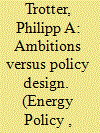

|
|
|
|
|
| Summary/Abstract |
Low energy access in sub-Saharan Africa has motivated the implementation of over 60 international electrification initiatives in the region. The US-led Power Africa initiative is one of the largest such efforts. Its central targets are to install 30 GW of additional capacity and create 60 million new connections to double electricity access by 2030. While Power Africa has received praise for its early achievements, an analysis of its targets and the rationale behind them reveals attributional, developmental and technical issues: Power Africa lacks a clear definition which criteria have to be met before African electrification projects can be counted towards fulfilling Power Africa's targets, the targets themselves appear to be too low to deliver on Power Africa's promises, and they exhibit several technical inconsistencies. Crucially, this paper argues that contrary to the Trump administration's intention to reduce its funds, Power Africa's targets and efforts need to be increased to meet the initiative's own ambitions.
|
|
|
|
|
|
|
|
|
|
|
|
|
|
|
|
| 2 |
ID:
147215
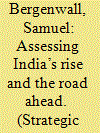

|
|
|
|
|
| Summary/Abstract |
This article analyses India’s economic, military and political rise in the international state system. It concludes that India is on the rise in all three power dimensions, underpinned by a larger share of global GDP. However, it also identifies the constraints on the way. On matters concerning its economy, India lags behind in industrial prowess, innovation, socio-economic development and financial strength. While modernising its defence capabilities, it faces obstacles due to budget issues, institutional constraints and a weak defence industry. At the global level, its political leverage is circumscribed by its small diplomatic corps, limited foreign aid, underutilised soft power assets and by an immediate neighbourhood that consumes much of its political energy. India’s rise could also be delayed by various domestic constraints as well as failure to adapt to ‘the second machine age’ and ‘the return of geopolitics’. Nevertheless, the probabilities of India’s continued rise in the international system are good, given its favourable demographics and catch-up opportunities related to labour productivity, urbanisation and digitisation.
|
|
|
|
|
|
|
|
|
|
|
|
|
|
|
|
| 3 |
ID:
068274
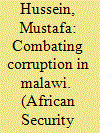

|
|
|
| 4 |
ID:
046066
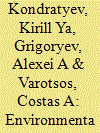

|
|
|
|
|
| Publication |
New Yoek, Springer, 2002.
|
| Description |
xxvi, 484p.
|
| Standard Number |
3540433031
|
|
|
|
|
|
|
|
|
|
|
|
Copies: C:1/I:0,R:0,Q:0
Circulation
| Accession# | Call# | Current Location | Status | Policy | Location |
| 046778 | 363.349/KON 046778 | Main | On Shelf | General | |
|
|
|
|
| 5 |
ID:
090409
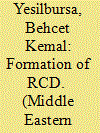

|
|
|
|
|
| Publication |
2009.
|
| Summary/Abstract |
The Regional Co-operation for Development (RCD) was set up by the regional members of the Central Treaty Organization (CENTO), Iran, Turkey and Pakistan, in July 1964 to strengthen their socio-economic development. However, a number of financial, political and administrative difficulties made progress under RCD slow. Despite assurances to the contrary, the probable impetus behind the formation of RCD was the unease with the politico-military aspects of CENTO. However, RCD's political significance grew steadily, and that of CENTO declined correspondingly. Nevertheless, recognizing that RCD could not provide an effective military substitute, Iran and Turkey still attached value to CENTO. After twelve unsatisfactory years, the three regional Heads of State held a summit in Izmir on 22 April 1976, making amendments to the 1964 declaration. The Treaty of Izmir was signed in 1977 as the legal framework for RCD. Yet, RCD was unsuccessful. In January 1985, Turkey, Iran and Pakistan established a new organisation called the Economic Co-operation Organization (ECO).
|
|
|
|
|
|
|
|
|
|
|
|
|
|
|
|
| 6 |
ID:
078902
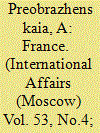

|
|
|
| 7 |
ID:
077712
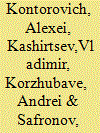

|
|
|
| 8 |
ID:
124423
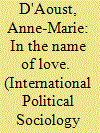

|
|
|
|
|
| Publication |
2013.
|
| Summary/Abstract |
The past 10 years have seen an increase in legislation pertaining to marriage migration in Europe. Such attention betrays various concerns and anxieties that intersect not only with issues of risk management, rights, and citizenship, but also with less tangible dimensions such as emotions, which become embedded in legal as well as in surveillance practices. Emotions such as love are integral to the institutions, procedures, analyses and reflections, calculation, and tactics that Foucault identified as part of governmental processes; the latter should not necessarily be equated with (and limited to) rationalized technocratic processes detached from emotional components. Technologies of love are central to the governmentality of marriage migration; as modes of subjectification and governing practice, they connect intimacy with citizenship. More than the manifestation of the rationalization of a specific emotion, technologies of love allow for an exploration of what an engagement with emotions such as love does to governmentality. Illustrations of the "attachment requirement" in Denmark, and the case of "Catgate" in Great Britain, show that technologies of love play a significant role in stirring and disciplining specific migration flows (what kind of marriage migrants the state welcomes or keeps at bay), but also in challenging, even if inadvertently, those policies and practices designed to gauge "true" relationships.
|
|
|
|
|
|
|
|
|
|
|
|
|
|
|
|
| 9 |
ID:
135451
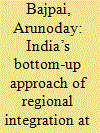

|
|
|
|
|
| Summary/Abstract |
The thirty years of existence of South Asian Association of Regional Cooperation (SAARC) amply demonstrates that it has experienced huge failures amidst patches of success stories. It has remained far away from its final goal of regional economic integration as well as fast socio-economic development. There have been many serious academic attempts to analyze the causes of its failures and put forth suggestions to remove its weaknesses. The policy makers in South Asian capital have struggled hard to overhaul its structures and operations, but final story remains the same e.g. South Asia is the least integrated region in the world.
|
|
|
|
|
|
|
|
|
|
|
|
|
|
|
|
| 10 |
ID:
156577
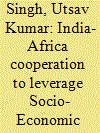

|
|
|
|
|
| Summary/Abstract |
African countries are targeted by Indian investors due to their high-growth markets, demographic potential and mineral rich reserves. India is the fifth largest country investing in Africa, with investments over the past 20 years amounting to $54 billion, 19.2% of all its total Foreign Direct Investment.
|
|
|
|
|
|
|
|
|
|
|
|
|
|
|
|
| 11 |
ID:
127047
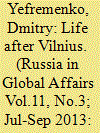

|
|
|
|
|
| Publication |
2013.
|
| Summary/Abstract |
This article presents some of the results of a project conducted as part of a Russian Academy of Sciences program: "Perspectives of Coordinated Social and Economic Development of Russia and Ukraine in the Pan-European Context."
A political anniversary passed largely unnoticed on 12 September 2013: fifty years ago on that date Turkey and the European Economic Community signed an association agreement. Although it might be a good time to look back on what has been achieved since then and make plans for the future, Turkish politicians have largely ignored the anniversary. And for good reason! While the association agreement resulted in tangible economic benefits for Turkey, in the political sense it doomed that ambitious country to 50 years of humiliating uncertainty in the antechamber of a unifying Europe. Today Ukraine, another large country, is impatiently waiting to be let into that antechamber. But no political analyst in his right mind will state that Ukraine will not have to wait longer than Turkey for full-fledged European Union membership.
|
|
|
|
|
|
|
|
|
|
|
|
|
|
|
|
| 12 |
ID:
058996
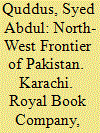

|
|
|
|
|
| Publication |
Karachi, Royal Book Company, 1990.
|
| Description |
xii, 424p.hbk
|
| Standard Number |
9694071054
|
|
|
|
|
|
|
|
|
|
|
|
Copies: C:1/I:0,R:0,Q:0
Circulation
| Accession# | Call# | Current Location | Status | Policy | Location |
| 049204 | 954.912004/QUD 049204 | Main | On Shelf | General | |
|
|
|
|
| 13 |
ID:
077709
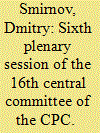

|
|
|
|
|
|
|
|